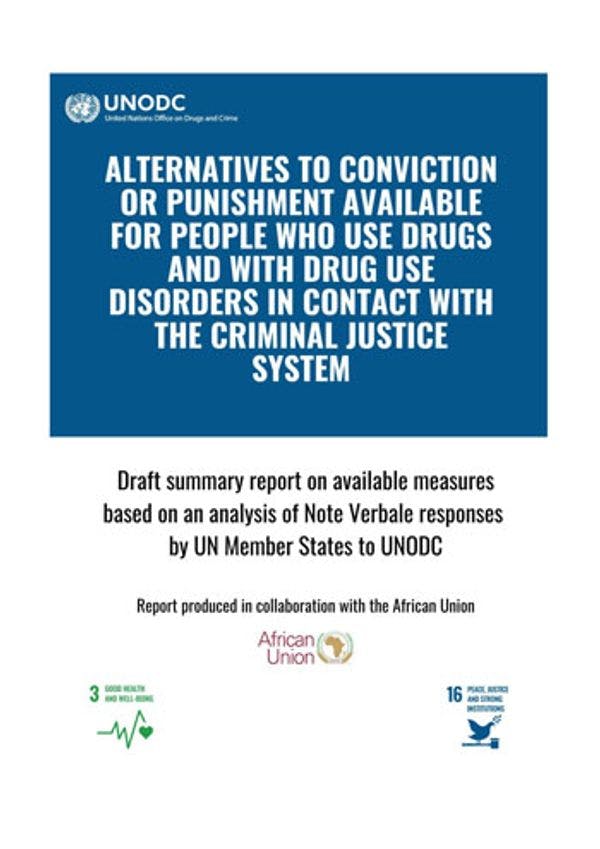Alternatives to conviction or punishment available for people who use drugs and with drug use disorders in contact with the criminal justice system
Alternatives to conviction or punishment available for people who use drugs and with drug use disorders in contact with the criminal justice system – Draft summary report on available measures based on an analysis of Note Verbale responses by UN Member states to UNODC
Conclusions
In general, there was high level agreement reported by Member States on the need for alternatives to conviction or punishment in the responses to the NVs. Many countries already have legal provision for these to be applied to people with drug use disorder in contact with the criminal justice system and in some cases they have them at all stages in the criminal justice process (and even a range of different types of measures available at each stage).
Nevertheless, despite the high level of policy commitments, the realities of implementing alternative options are striking; some countries reported having no alternatives available, and others have legal provision for alternatives that are never or rarely used. This may be a reflection of wider issues around the overall availability of treatment for drug use disorders. According to the 2021 UNODC World Drug Report, 49 only 1 in 8 persons with a drug use disorder has access to treatment. This is a challenge that needs to be addressed jointly with developing the legal framework and the implementation of alternatives to conviction or punishment for people with drug use disorders in contact with the criminal justice system.
Alternatives can be challenging to establish as it is essential to have the infrastructure and trained human resources for evidence-based assessment, treatment, supervision, and other health and social support available and they should be evaluated to demonstrate their effectiveness and positive health, social and justice outcomes. Alternative measures also need to be designed so that those who should benefit from them are legally eligible – making the criteria for who can qualify overly complex and prescriptive can make alternatives difficult to be applied in practice. Also, both professionals and the public need to be supportive of the approach if it is to be successful so programmes need to be developed to ensure they have the information and knowledge and see the benefits of providing health services and other effective alternatives to conviction or punishment for people who use drugs in contact with the criminal justice system.
The establishment of networks and mentoring programmes for the sharing of good practice and experience of implementing alternative measures can be helpful for those setting alternatives up. Some are already in existence.
There is a wide variety of options for providing alternatives to conviction or punishment for people with drug problems in contact with the criminal justice system. Ideally, alternative measures available at all stages of the criminal justice system need to be appropriately tailored to different groups. Despite the availability of alternatives to conviction or punishment for people who use drugs and with drug use disorders in all regions, there is still relatively little information on their accessibility, implementation and impact in most places – more monitoring and evaluation is needed to ensure the alternatives are used and are successful. Taking an incremental approach to monitoring and evaluating to allow for changes is important for making them work in the national context.
In summary, there is a need to build on the existing policy consensus and the interest expressed by Member States in their NV responses summarized in this paper. At the same time, legal framework and drug use disorder treatment infrastructure along a continuum of care and in line with the International Standards for the Treatment of Drug Use Disorders must be developed. Such efforts need to be incrementally monitored and evaluated to contribute to a growing body of evidence, including from low- and middle-income countries, on the individual and community benefits of providing treatment of drug use disorders as an alternative to conviction or punishment for those in need.
